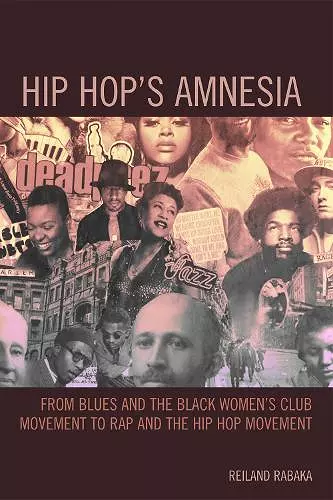Hip Hop's Amnesia
From Blues and the Black Women's Club Movement to Rap and the Hip Hop Movement
Format:Hardback
Publisher:Lexington Books
Published:18th May '12
Currently unavailable, and unfortunately no date known when it will be back
This hardback is available in another edition too:
- Paperback£50.00(9780739174920)

What did rap music and hip hop culture inherit from the spirituals, classic blues, ragtime, classic jazz, and bebop? What did rap music and hip hop culture inherit from the Black Women’s Club Movement, New Negro Movement, Harlem Renaissance, Hipster Movement, and Black Muslim Movement? How did black popular music and black popular culture between 1900 and the 1950s influence white youth culture, especially the Lost Generation and the Beat Generation, in ways that mirror rap music and hip hop culture’s influence on contemporary white youth music, culture, and politics? In Hip Hop’s Amnesia award-winning author, spoken-word artist, and multi-instrumentalist Reiland Rabaka answers these questions by rescuing and reclaiming the often-overlooked early twentieth century origins and evolution of rap music and hip hop culture. Hip Hop’s Amnesia is a study about aesthetics and politics, music and social movements, as well as the ways in which African Americans’ unique history and culture has consistently led them to create musics that have served as the soundtracks for their socio-political aspirations and frustrations, their socio-political organizations and nationally-networked movements. The musics of the major African American social and political movements of the 1950s, 1960s, and 1970s were based and ultimately built on earlier forms of “African American movement music.” Therefore, in order to really and truly understand rap music and hip hop culture we must critically examine both classical African American musics and the classical African American movements that these musics served as soundtracks for. This book is primarily preoccupied with the ways in which post-enslavement black popular music and black popular culture frequently served as a soundtrack for and reflected the grassroots politics of post-enslavement African American social and political movements. Where many Hip Hop Studies scholars have made clever allusions to the ways that rap music and hip hop culture are connected to and seem to innovatively evolve earlier forms of black popular music and black popular culture, Hip Hop’s Amnesia moves beyond anecdotes and witty allusions and earnestly endeavors a full-fledged critical examination and archive-informed re-evaluation of “hip hop’s inheritance” from the major African American musics and movements of the first half of the twentieth century: classic blues, ragtime, classic jazz, swing, bebop, the Black Women’s Club Movement, the New Negro Movement, the Harlem Renaissance, the Bebop Movement, the Hipster Movement, and the Black Muslim Movement.
Reiland Rabaka has made an intellectual contribution to the study of Black art, has indeed remixed it, in a way that rivals the sonic contributions of Ron G – the Godfather of the Remix himself. More than enough discussion of hip-hop omits the cultural, political and historical contexts out of which hip-hop emerged and in which it currently exists demanding just this kind of assault on our imposed amnesia. Rabaka is to be commended for his contribution and recognized as the intellectual force he is and which his subject(s) truly deserve. -- Jared A. Ball, Morgan State University
In Hip Hop’s Amnesia, Rabaka offers a comprehensive analysis of the forgotten historical legacy of hip hop music, culture, and politics. Some say hip hop is more than music —Rabaka proves it. Others point to hip hop as the latest in the lineage of African American expressive forms —Hip Hop’s Amnesia details it. Insisting on placing African American music, from the blues to hip hop, within its broader context, Rabaka deftly illustrates the interplay of music, culture, and politics while paying close attention to the politics of class, gender, and sexuality in inter- and intra-racial relations. If we need to know where we’re from in order to know where we’re at, then Rabaka is an important narrator in this process. -- Nitasha Sharma, Northwestern University
Rabaka (African, African American, and Caribbean studies, Univ. of Colorado, Boulder) set out to fill gaps in the literature with regard to hip-hop's interconnectedness with earlier 20th-century black musical forms and cultural expressions. He is largely successful in this pursuit: this is not a retread of earlier work on hip-hop's origins, a subject well covered in countless books. Rabaka is a virtual encyclopedia of hip-hop and black culture....The work raises many provocative and important questions, not only about hip-hop's development but also about black culture in general. In addition, the unique concept of using "remixes" instead of chapters is refreshing; subheadings are employed throughout to break up the five lengthy "remixes." Summing Up: Recommended. * CHOICE *
Reiland Rabaka’s Hip Hop’s Amnesia: From Blues and the Black Women’s Club Movement to Rap and the Hip Hop Movement contribute to and expand the conversation on rap and hip hop’s cultural, aesthetic, political, and social value. Employing the language and critical techniques of rap artists, Rabaka “sample” histories of American popular music and political activism. Through their efforts, this forgotten or ignored history comes to have immediate and radical implications for an academic, as well as a more general, audience. Rabaka offers an expansive reading of the genre’s history. Rabaka’s Hip Hop’s Amnesia effectively accomplishes the ambitious project of charting the political, aesthetic, cultural, and social origins and precursors to what he terms the “hip hop movement.” * Callaloo *
Reiland Rabaka’s approach to the social, musical and most of all the political past of the style(s) is quite an enterprise...What Rabaka most convincingly succeeds at then is the survey of the many forefathers of hip hop, a remix in a way; this expression carries most of his arguments in the study. * Jive-Talk.com *
ISBN: 9780739174913
Dimensions: 235mm x 159mm x 30mm
Weight: 748g
384 pages